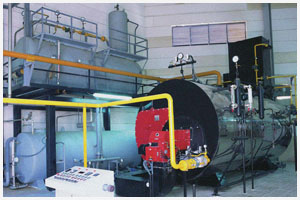
The hot water boiler is hot under 100 ° C, saturated steam temperature at atmospheric pressure, with a closed system operating flame-smoke pipes circulating the flame-smoke gases generated by the combustion of a fuel giving heat on the pressure vessels producing water.
Contrary to popular belief, a hot water boiler is not the same as a steam boiler. Steam boilers are thought to be more efficient than hot water boilers. However, when used correctly, hot water boilers can be more efficient than steam boilers. From two boilers with the same heating surface, hot water boilers produce more heat than steam boilers.
With the intensification of the use of natural gas and LPG, there have been many changes in boiler design techniques and technologies, and there are many different hot water boilers in practice. In general, they vary depending on the material used, the general form and the methods of heating: cast boilers, steel boilers, standard boilers, low temperature boilers and condensing boilers.
There are also hot water boilers, solid fuel boilers, liquid fuel boilers and gas fired boilers depending on the type of fuel used. Cast iron boilers are used in the production of hot water and low pressure steam. Steel hot water boilers TS 497 Boilers - Steel material (welded) is within the scope of the standard. Steam and superheated water boilers are TS 377-12 EN 12953-12 Cylindrical boilers - Part 12: Part of the standard for specifications for grate combustion systems of solid fuel fired boilers.
The principle of hydrostatic testing is generally adopted in the periodic inspection and control of hot water boilers. These tests must be repeated at least once a year. During the tests, if there is no contrary provision in the standards, 1,5 times the operating pressure is applied in hot water boilers.
However, if it is not possible to perform hydrostatic testing by taking into consideration the characteristics and conditions of the facility where hot water boilers are used, non-destructive testing methods specified in the standards may be applied instead of hydrostatic testing. In this case, this situation shall be indicated in the reports to be prepared after the inspection and controls.
Boiling water and high pressure, these equipment can be extremely dangerous for life and property safety. For this reason, periodic inspection and control of hot water boilers must be carried out by mechanical engineers, machine technicians or high technicians. Furthermore, their information should be recorded electronically in the Ministry of Labor and Social Security and if this directive is not followed, neither the validity of the inspection and control procedures carried out nor the reports issued shall be of value.
For more information, you can reach our expert team from our contact addresses and phone numbers and you can get answers to all your questions.